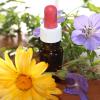CYBERMED LIFE - ORGANIC & NATURAL LIVING
CYBERMED LIFE - ORGANIC & NATURAL LIVING
Bach flo wer remedies (BFRs) are solutions of brandy and water—the water containing extreme dilutions of flower material developed by Edward Bach, an English homeopath, in the 1930s. Bach claimed that dew found on flower petals retain imagined healing properties of that plant. Systematic reviews of clinical trials of Bach flower solutions have found no efficacy beyond a placebo effect.
wer remedies (BFRs) are solutions of brandy and water—the water containing extreme dilutions of flower material developed by Edward Bach, an English homeopath, in the 1930s. Bach claimed that dew found on flower petals retain imagined healing properties of that plant. Systematic reviews of clinical trials of Bach flower solutions have found no efficacy beyond a placebo effect.
The solutions, which contain a 50:50 mix of water and brandy, are called mother tincture. Stock remedies—the solutions sold in shops—are dilutions of mother tincture into other liquid. Most often the liquid used is alcohol, so that the alcohol level by volume in most stock Bach remedies is between 25 and 40% (50 to 80 proof). The solutions do not have a characteristic scent or taste of the plant because of dilution. It is claimed that the remedies contain energetic or vibrational nature of the flower and that this can be transmitted to the user. The solutions are described by some as vibrational medicines, which implies they rely on the pseudoscientific concept of water memory. They are often labeled as homeopathic because they are extremely diluted in water, but are not homeopathy as they do not follow other homeopathic ideas such as the law of similars.